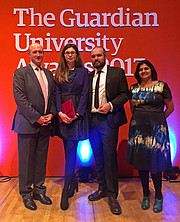Announcement
Pale Red Dot Campaign Wins Guardian University Award
30 March 2017
The success of the Pale Red Dot campaign [1] was recognised in style last night when Queen Mary University of London, the institution that led the campaign [2], won the Research Impact category of the Guardian University Awards 2017. The Pale Red Dot campaign was an outreach [3] project set up to provide the public with a unique real-time view of how science is carried out. The scientific programme was aimed at identifying an Earth-like planet around Proxima Centauri, the closest star to the Solar System. The award marked the significant contribution made by the campaign to bringing cutting-edge science to a general audience.
The campaign was launched in January 2016, when observations of Proxima Centauri began, using ESO telescopes such as the HARPS spectrograph at La Silla in Chile, amongst others [4]. Their search lasted until April 2016, and was accompanied by blog posts and social media updates via Facebook and Twitter. The reports were accompanied by numerous outreach articles written by specialists around the world. Following the observations, the scientists analysed the data in the hope that they would find what they had been looking for. In August 2016, the discovery was announced: they had found an exoplanet!
Innovative outreach projects such as this continue to inspire and enthrall the public by bringing them closer to the excitement of making new discoveries and highlighting the scientific process.
Notes:
[1] The name Pale Red Dot reflects Carl Sagan’s famous reference to the Earth as a pale blue dot. As Proxima Centauri is a red dwarf star it will bathe its orbiting planet in a pale red glow.
[2] The team of astronomers leading the observations and outreach campaign are: Guillem Anglada-Escudé, Gavin Coleman, John Strachan (Queen Mary University of London, UK), James Jenkins (Universidad de Chile, Chile), Cristina Rodriguez-Lopez, Zaira M. Berdinas, Pedro J. Amado (Instituto de Astrofisica de Andalucia/CSIC), Julien Morin (Universite de Montpellier, France), Mikko Tuomi (Centre for Astrophysics Research/University of Hertfordshire, UK), Yiannis Tsapras (Heidelberg/LCOGT, Astronomisches Rechen-Institut – Heidelberg & LCOGT) and Christopher J. Marvin (University of Goettingen).
[3] The outreach campaign was coordinated by the project team with support from the outreach departments of ESO, Queen Mary University of London, Instituto de Astrofisica de Andalucia/CSIC, Universite de Montpellier, University of Goettingen, Universidad de Chile and Las Cumbres Observatory Global Telescope Network.
[4] Besides data from the Pale Red Dot campaign, contributions were made from scientists who have been observing Proxima Centauri for many years. These include members of the original UVES/ESO M-dwarf programme (Martin Kürster and Michael Endl), and exoplanet search pioneers such as R. Paul Butler. Public observations from the HARPS/Geneva team obtained over many years were also included.
More information:
This research is presented in a paper entitled “A terrestrial planet candidate in a temperate orbit around Proxima Centauri”, by G. Anglada-Escudé et al., which appeared in the journal Nature on 25 August 2016.
Links
- Guardian University Award winners announcement
- Research paper in Nature
- Pale Red Dot blog
- QMUL press release
- ESO press release
Contacts
Guillem Anglada-Escudé (Lead Scientist)
Queen Mary University of London
London, United Kingdom
Tel: +44 (0)20 7882 3002
Email: g.anglada@qmul.ac.uk
Peter Grimley
ESO Assistant Public Information Officer
Garching bei München, Germany
Tel: +49 89 3200 6383
Email: pgrimley@partner.eso.org
About the Announcement
| Id: | ann17013 |
Our use of Cookies
We use cookies that are essential for accessing our websites and using our services. We also use cookies to analyse, measure and improve our websites’ performance, to enable content sharing via social media and to display media content hosted on third-party platforms.
ESO Cookies Policy
The European Organisation for Astronomical Research in the Southern Hemisphere (ESO) is the pre-eminent intergovernmental science and technology organisation in astronomy. It carries out an ambitious programme focused on the design, construction and operation of powerful ground-based observing facilities for astronomy.
This Cookies Policy is intended to provide clarity by outlining the cookies used on the ESO public websites, their functions, the options you have for controlling them, and the ways you can contact us for additional details.
What are cookies?
Cookies are small pieces of data stored on your device by websites you visit. They serve various purposes, such as remembering login credentials and preferences and enhance your browsing experience.
Categories of cookies we use
Essential cookies (always active): These cookies are strictly necessary for the proper functioning of our website. Without these cookies, the website cannot operate correctly, and certain services, such as logging in or accessing secure areas, may not be available; because they are essential for the website’s operation, they cannot be disabled.
Functional Cookies: These cookies enhance your browsing experience by enabling additional features and personalization, such as remembering your preferences and settings. While not strictly necessary for the website to function, they improve usability and convenience; these cookies are only placed if you provide your consent.
Analytics cookies: These cookies collect information about how visitors interact with our website, such as which pages are visited most often and how users navigate the site. This data helps us improve website performance, optimize content, and enhance the user experience; these cookies are only placed if you provide your consent. We use the following analytics cookies.
Matomo Cookies:
This website uses Matomo (formerly Piwik), an open source software which enables the statistical analysis of website visits. Matomo uses cookies (text files) which are saved on your computer and which allow us to analyze how you use our website. The website user information generated by the cookies will only be saved on the servers of our IT Department. We use this information to analyze www.eso.org visits and to prepare reports on website activities. These data will not be disclosed to third parties.
On behalf of ESO, Matomo will use this information for the purpose of evaluating your use of the website, compiling reports on website activity and providing other services relating to website activity and internet usage.
Matomo cookies settings:
Additional Third-party cookies on ESO websites: some of our pages display content from external providers, e.g. YouTube.
Such third-party services are outside of ESO control and may, at any time, change their terms of service, use of cookies, etc.
YouTube: Some videos on the ESO website are embedded from ESO’s official YouTube channel. We have enabled YouTube’s privacy-enhanced mode, meaning that no cookies are set unless the user actively clicks on the video to play it. Additionally, in this mode, YouTube does not store any personally identifiable cookie data for embedded video playbacks. For more details, please refer to YouTube’s embedding videos information page.
Cookies can also be classified based on the following elements.
Regarding the domain, there are:
- First-party cookies, set by the website you are currently visiting. They are stored by the same domain that you are browsing and are used to enhance your experience on that site;
- Third-party cookies, set by a domain other than the one you are currently visiting.
As for their duration, cookies can be:
- Browser-session cookies, which are deleted when the user closes the browser;
- Stored cookies, which stay on the user's device for a predetermined period of time.
How to manage cookies
Cookie settings: You can modify your cookie choices for the ESO webpages at any time by clicking on the link Cookie settings at the bottom of any page.
In your browser: If you wish to delete cookies or instruct your browser to delete or block cookies by default, please visit the help pages of your browser:
Please be aware that if you delete or decline cookies, certain functionalities of our website may be not be available and your browsing experience may be affected.
You can set most browsers to prevent any cookies being placed on your device, but you may then have to manually adjust some preferences every time you visit a site/page. And some services and functionalities may not work properly at all (e.g. profile logging-in, shop check out).
Updates to the ESO Cookies Policy
The ESO Cookies Policy may be subject to future updates, which will be made available on this page.
Additional information
For any queries related to cookies, please contact: pdprATesoDOTorg.
As ESO public webpages are managed by our Department of Communication, your questions will be dealt with the support of the said Department.


